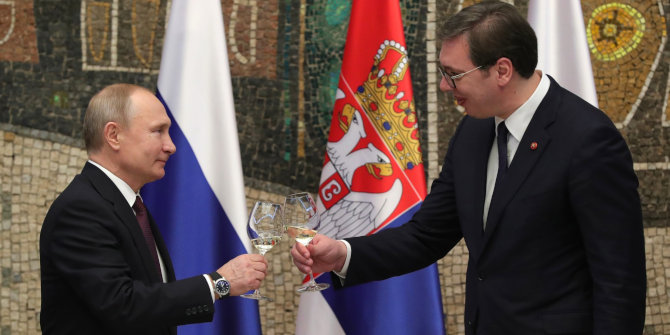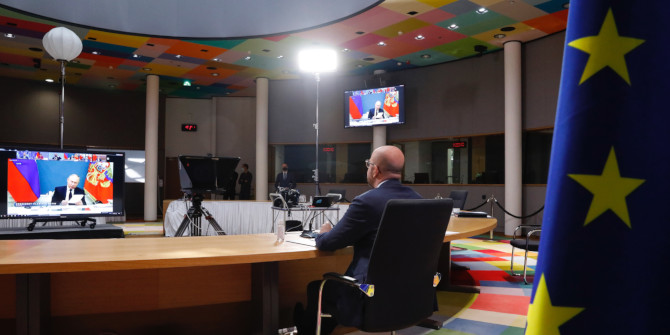The European Commission recently adopted its 2023 Enlargement Package. Marika Djolai writes that while Russia’s invasion of Ukraine appears to have put enlargement back on the agenda, it remains a polarised process.
On 8 November, the European Commission adopted its 2023 Enlargement Package, which contained some positive signals about EU accession for the trio of Georgia, Moldova and Ukraine, as well as for the countries of the Western Balkans. The package was presented alongside a Growth Plan for the Western Balkans that includes €6 billion of funding, to be spent between 2024 and 2027. This is intended to stimulate economic progress and integration into the EU’s single market.
Meanwhile, after years of the Western Balkans states asking for a specific timeline, the European Council has finally indicated an informal target of 2030 for their accession. All of this raises the question of whether we are finally seeing some real progress toward enlargement and reforming the EU.
Progress amid security concerns
Russia’s invasion of Ukraine and the drastic escalation of the Israel-Palestine conflict have raised security concerns in the EU and globally. This has created momentum for enlargement to return to the agenda. In her statement to accompany the 2023 Enlargement Package, Ursula von der Leyen, President of the European Commission, emphasised that enlargement represents an investment in security, while also increasing the global attractiveness of the EU.
Georgia, Moldova and Ukraine have fared better in this context than the Western Balkans. The Commission has recommended opening negotiations with Moldova and Ukraine, a little over 16 months after they were granted candidate status. For comparison, the gap between North Macedonia being granted candidate status and the opening of negotiations took 17 years, while Albania faced a wait of 8 years.
Which countries are best placed to secure accession?
Every year, the Commission assesses each candidate country’s progress against a set of accession criteria (known as the Copenhagen criteria) and issues a report. This exercise receives a great deal of attention, yet with the reports getting longer every year – running to an astounding 160 pages for Serbia this time round – and with conclusions often stated in vague language, it is questionable how useful they really are for each country.
All six countries in the Western Balkans have been criticised for their weak judicial systems, limited progress in the fight against corruption and for a lack of fundamental freedoms, including for the media. All these factors are viewed as enabling an authoritarian shift across the region.
The Western Balkans
Serbia represents the largest country in the Western Balkans. However, far from being a front runner, the country’s 2023 report shows limited progress in almost all areas. The country’s President, Aleksandar Vučić, has called snap parliamentary elections for December 2023, less than two years after the last parliamentary elections in April 2022. The progress report criticised the fact the current Serbian Parliament has no annual work plan and does not apply a code of conduct systematically.
The situation in Serbia has a direct impact on Kosovo. Northern Kosovo has recently seen an escalating crisis and there remains no normalisation in relations between Kosovo and Serbia, which is a condition for Serbia’s EU accession process. Internally, Kosovo’s progress report identified little progress in all key areas, particularly in the fight against corruption and the management of migration. EU visa liberalisation for Kosovo is due to enter into force from 1 January 2024, but it remains on hold due to the reservations of several EU member states.
Bosnia and Herzegovina was granted candidate status in December 2022 after a long wait but didn’t get approval in the 2023 Enlargement Package to open negotiations. The Commission did recommend that they should open negotiations subject to certain conditions being met. The country must also implement 14 key priorities laid out when the candidate status was granted.
Serbia also has a destabilising influence on Bosnia and Herzegovina. The actions of Milorad Dodik, the president of the predominantly Serb populated Republika Srpska, have generated instability within the country in recent years. Bosnia and Herzegovina’s progress report also noted little progress in key areas over the last year. Despite the EU’s announced commitment and support, it is unlikely Bosnia and Herzegovina will make fast progress on its path to accession.
Montenegro was the first to open accession negotiations in 2012 and was once considered the frontrunner in the process. However, this advantage has long since disappeared. The country’s 2023 progress report documents problems common with the other Western Balkans countries. Overall, there is a sense of the process stagnating in Montenegro amid institutional and systemic challenges.
The progress report for North Macedonia noted moderate levels of preparation for EU accession in key areas. However, it also recognised new political challenges and an increase in polarisation across the country. North Macedonia’s bid for EU membership was blocked in 2020 by demands from Bulgaria for constitutional changes relating to its history, nationhood and the recognition of minorities. Yet good collaboration between the two countries is reported in other areas, such as on infrastructure projects and police cooperation. The country’s situation highlights a bigger problem that bilateral disputes pose for the accession process.
Finally, Albania’s 2023 progress report suggests the country is engaged and fully committed to the EU in its foreign policy, with a good level of preparation in the field of external relations, foreign security and defence. Negotiations with Albania have already been opened and the Commission recently published a screening report that indicates smooth progress. However, the country is still lagging behind on internal reforms, particularly in the fight against organised crime.
Georgia, Moldova, Turkey and Ukraine
The Commission announced on 8 November that Georgia should be granted candidate status subject to the country meeting a set of nine conditions. This occurred despite Georgia failing to fully align its foreign policy with the EU in relation to Russia and Belarus. Despite this apparent progress, the reforms that are required for Georgia to make progress are likely to be met with strong resistance from the country’s ruling party, which may permanently stall any hopes of accession.
Moldova and Ukraine are now clearly the frontrunners in the process. They are also the two states who most need and want EU membership as they seek to defend themselves against Russian aggression. Ukraine’s progress report documents an improved track record on high-level corruption investigations and convictions over the last six months, as well as improvements to the country’s institutional framework. Moldova has shown commitment to pursuing judicial reforms and establishing a strong parliament and strong institutional and legislative frameworks on fundamental rights. It has managed to deliver the nine steps that were set as a condition for opening negotiations.
Finally, Turkey, a candidate since 1999, can’t be entirely neglected, despite a complete deterioration in progress on human and fundamental rights, as well as other domestic and international problems. Its political and financial influence in the key geographic and strategic areas that are important to Europe is enough to keep the country on the EU accession table for now.
An uneven process
Despite the apparent progress toward future EU enlargement, the accession process remains polarised. It now increasingly depends on geopolitical developments affecting aspiring countries in the EU neighbourhood, which makes it appear more of a political process than one based on merit.
The economic cost of enlargement is also important, given the operating budget of a 36 member European Union would be predicted to increase by more than 250 billion euros. There are also major challenges associated with absorbing a country the size of Ukraine into the EU.
With all these challenges, the EU needs to engage in a reform process of its own. Enlargement will cause a wider overhaul that will impact on the EU’s institutions and modus operandi. To enhance its influence in the world, the EU should now include states that are not yet members but sit within the EU’s orbit.
Note: This article gives the views of the author, not the position of EUROPP – European Politics and Policy or the London School of Economics. Featured image credit: European Union





